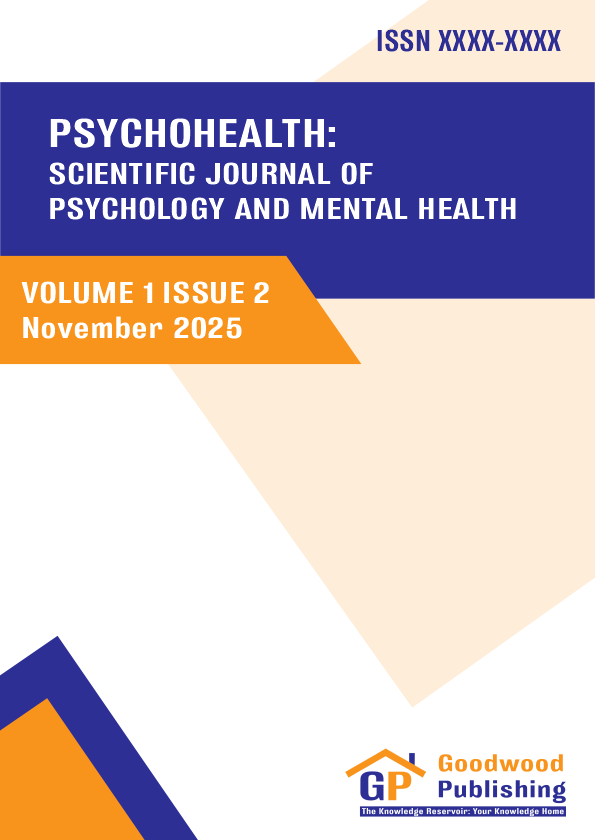Article Details
Vol. 1 No. 2 (2025): November
Psychological features of emotional relationships in primary school teachers
Abstract
Purpose: This study aims to analyze the psychological features of emotional relationships among primary school teachers, focusing on the mechanisms that influence teachers’ interactions with students, parents, and colleagues. It explores how emotional intelligence, empathy, and stress regulation contribute to building emotionally healthy learning environments and improving teachers’ professional effectiveness.
Methodology: A mixed-methods approach was used, combining quantitative and qualitative data to ensure a comprehensive understanding of teachers’ emotional dynamics. The study involved 100 primary school teachers (aged 25–55) selected through stratified random sampling. Instruments included an Emotional Intelligence Questionnaire based on Goleman’s framework, the Teacher–Student Relationship Scale, classroom observations, and semi-structured interviews. Quantitative data were analyzed through correlation statistics, while qualitative data were examined thematically to identify patterns of emotional regulation, empathy, and stress management.
Results: Findings revealed a strong positive correlation between emotional intelligence and the quality of teacher student relationships. Teachers demonstrating higher self-awareness, empathy, and emotional control experienced fewer conflicts, greater student trust, and higher job satisfaction. Gender and experience differences were also observed female and veteran teachers generally showed higher emotional resilience and relational stability.
Conclusion: The study concludes that emotional intelligence is a vital component of teaching competence, shaping classroom climate, communication, and teacher well-being. Developing emotional awareness and regulation enhances both instructional quality and student outcomes.
Limitations: The study was limited to one educational context and relied partly on self-reported data, which may influence objectivity.
Contribution: This research contributes to educational psychology by emphasizing emotional competence as a core element of teacher professionalism and by providing practical insights for teacher training, counseling, and educational policy.
Keywords
How to Cite
Download Citation
References
- Aldrup, K., Carstensen, B., & Klusmann, U. (2024). The role of teachers’ emotion regulation in teaching effectiveness: A systematic review integrating four lines of research. Educational Psychologist, 59(2), 89-110. doi:https://doi.org/10.1080/00461520.2023.2282446
- Bantilan, J. C., Sombilon, E. J. J., Regidor, A. R., Mondoyo, D. P., & Edig, M. M. N. (2024). Impact of transformational leadership and school environment on teachers’ organizational commitment. Journal of Social, Humanity, and Education, 4(2), 99-116. doi:https://doi.org/10.35912/jshe.v4i2.1584
- Brackett, M. A., Rivers, S. E., & Salovey, P. (2011). Emotional intelligence: Implications for personal, social, academic, and workplace success. Social and Personality Psychology Compass, 5(1), 88-103. doi:https://doi.org/10.1111/j.1751-9004.2010.00334.x
- Chan, S. W., Pöysä, S., Lerkkanen, M.-K., & Pakarinen, E. (2025). Teachers’ occupational well-being in relation to teacher–student interactions in primary school. Journal of Early Childhood Education Research, 14(1), 1-27. doi:https://doi.org/10.58955/jecer.145766
- Day, C., & Leitch, R. (2001). Teachers’ and teacher educators’ lives: The role of emotion. Teaching and teacher education, 17(4), 403-415. doi:https://doi.org/10.1016/S0742-051X(01)00003-8
- Emeljanovas, A., Sabaliauskas, S., Mežien?, B., & Istomina, N. (2023). The relationships between teachers’ emotional health and stress coping. Frontiers in Psychology, 14, 1276431. doi:https://doi.org/10.3389/fpsyg.2023.1276431
- Galanakis, M., Krana, L., & Nikola, M. (2021). Emotional intelligence in primary school teachers: the effect of gender, age and tenure. Psychology, 12(11), 1781-1789. doi:https://doi.org/10.4236/psych.2021.1211107
- Goleman, D. (2005). Emotional intelligence: Why it can matter more than IQ: Bantam.
- Jennings, P. A., & Greenberg, M. T. (2009). The prosocial classroom: Teacher social and emotional competence in relation to student and classroom outcomes. Review of educational research, 79(1), 491-525. doi:https://doi.org/10.3102/0034654308325693
- Koryataini, L., Sumo, M., Minnah, L., Solehah, S., & Khoiroh, A. R. A. (2024). Analisis Penggunaan Media Pembelajaran PhET pada Materi Gelombang Berjalan dan Stasioner: A Review Literatur. Mutiara: Jurnal Ilmiah Multidisiplin Indonesia, 2(3), 120-138. doi:https://doi.org/10.61404/jimi.v2i3.256
- McGrath, K. F., & Van Bergen, P. (2017). Elementary teachers' emotional and relational expressions when speaking about disruptive and well behaved students. Teaching and teacher education, 67, 487-497. doi:https://doi.org/10.1016/j.tate.2017.07.016
- Meechandee, S., & Meekaew, N. (2025). Integrating phenomenon-based learning and GIS to improve geo-literacy and student engagement: an action research approach. Discover Education, 4(1), 91. doi:https://doi.org/10.21203/rs.3.rs-5410327/v1
- Nias, J. (1996). Thinking about feeling: The emotions in teaching. Cambridge journal of education, 26(3), 293-306. doi:https://doi.org/10.1080/0305764960260301
- Rani, S. (2025). Studying the impact of anxiety, stress, and emotion on academic performance: A systematic review. Journal of Social, Humanity, and Education, 5(2), 131-141. doi:https://doi.org/10.35912/jshe.v5i2.2437
- Ridho, F. M. (2023). Kajian Literatur: Faktor-Faktor Penyebab Kejadian Dissociative Trance Disorder pada Pelajar. Kajian Psikologi dan Kesehatan Mental, 1(1), 25-33. doi:https://doi.org/10.35912/kpkm.v1i1.2039
- Russell Hochschild, A. (2012). The managed heart: commercialization of human feeling.
- Saleh, A. Y., Kurniawati, F., Salim, R. M. A., & Poerwandari, E. K. (2024). Factors influencing the well-being of primary school teachers in Indonesia: a pilot study. Psychological Research on Urban Society, 7(1), 3. doi:https://doi.org/10.7454/proust.v7i1.1140
- Salovey, P. E., & Sluyter, D. J. (1997). Emotional development and emotional intelligence: Educational implications: Basic Books.
- Schutz, P. A., & Zembylas, M. (2009). Introduction to advances in teacher emotion research: The impact on teachers’ lives Advances in teacher emotion research: The impact on teachers’ lives (pp. 3-11): Springer.
- Sobirovich, T. B. (2020). The strategy of renewal of the national spirituality of Uzbekistan. International Journal of applied research, 6(5), 147-151. doi:https://doi.org/10.31149/ijie.v3i8.545
- Sobirovich, T. B. (2023). Basic Criteria for Building the Third Renaissance in Uzbekistan. Asian Journal of Applied Science and Technology (AJAST), 7(1), 149-157. doi:https://doi.org/10.38177/ajast.2023.7114
- Sutton, R. E., & Wheatley, K. F. (2003). Teachers' emotions and teaching: A review of the literature and directions for future research. Educational psychology review, 15(4), 327-358. doi:https://doi.org/10.1023/a:1026131715856
- von Reumont, F., & Budke, A. (2021). Spatial thinking with comics in geography education. Paper presented at the Frontiers in Education.
- Wang, H., Hall, N. C., & King, R. B. (2021). A longitudinal investigation of teachers’ emotional labor, well-being, and perceived student engagement. Educational Psychology, 41(10), 1319-1336. doi:https://doi.org/10.1080/01443410.2021.1988060
- Yin, H.-b., Lee, J. C. K., Zhang, Z.-h., & Jin, Y.-l. (2013). Exploring the relationship among teachers' emotional intelligence, emotional labor strategies and teaching satisfaction. Teaching and teacher education, 35, 137-145. doi:https://doi.org/10.1016/j.tate.2013.06.006
License

This work is licensed under a Creative Commons Attribution-ShareAlike 4.0 International License.

